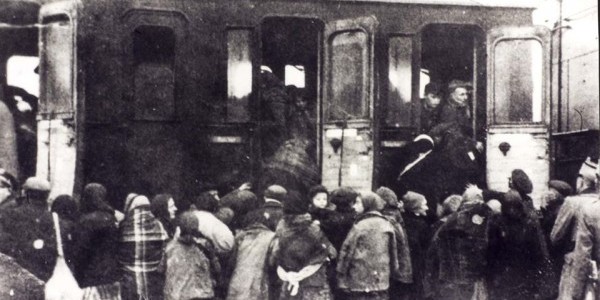Płock 77 lat od likwidacji getta
28/10/2019 | Na stronie od 28/10/2019

Na zdjęciu: Likwidacja getta w Płońsku (fotografia ze zbiorów Archiwum Pracowni Dokumentacji Dziejów Miasta Płońska)
In the picture: Liquidation of the ghetto in Płońsk (photo from the collection of the Archive of the Documentation Workshop of the City of Płońsk).
"Dziś 77 rocznica rozpoczęcia likwidacji getta w Płońsku. Getto powstało we wrześniu 1940 roku. Obejmowało swym zasięgiem ulicę Kozią, Pułtuską, Warszawską, Krzywą i Wyszogrodzką. W końcowym okresie istnienia getta przebywało tu około 12 tysięcy osób - zarówno Żydzi z Płońska, jak również z Nowego Miasta, Dobrzynia nad Wisłą, Dobrzynia nad Drwęcą, Lipna, Sierpca oraz Rypina."
28 października 1942 roku rozpoczęła się likwidacja getta. W pierwszym transporcie do Auschwitz-Birkenau wywieziono 2 tysiące Żydów. Drugi transport wyruszył w nocy z 15 na 16 grudnia 1942 roku...
Już od 12 lat płońszczanie organizują Marsz Milczenia upamiętniający likwidację płońskiego getta. Tragedię, w wyniku której śmierć w obozach zagłady poniosła połowa mieszkańców przedwojennego Płońska. Tegoroczny marsz towarzyszył III Festiwalowi Kultury Żydowskiej w mieście Ben Guriona.
Poniżej dwa artykuły autorstwa Gabrieli Nowak-Dąbrowskiej, wiceprezes Fundacji Nobiscum, poświęcone życiu i działalności Artura Bera oraz jego wspomnieniom o płońskim getcie, na podstawie jego relacji spisanej w roku 1960, znajdującej się w zbiorach Yad Vashem: World Holocaust Center, Jerusalem.
- Gabriela Nowak-Dąbrowska "Chęć łamie wszelkie przeszkody ..." Alter Ber in memoriam
- Gabriela Nowak-Dąbrowska "Ze wspomnień lekarza o getcie w Płońsku"
Alter (Artur) Ber (1908-1977) - pochodzący z Płocka lekarz weterynarii, pełnił funkcję lekarza w getcie w Płońsku. Do jego zadań należało prowadzenie szpitala oraz wszystkich innych działów służby zdrowia i higieny publicznej. Własnymi siłami zorganizował w płońskim getcie łaźnię dla chorych oraz aptekę. W grudniu 1942 roku Artur Ber wyruszył wraz z żoną transportem likwidującym getto w Płońsku do Oświęcimia. Udało im się uciec i ukryć w Warszawie pod nazwiskiem "Borowscy". ✡️?
Na zdjęciu: Likwidacja getta w Płońsku (fotografia ze zbiorów Archiwum Pracowni Dokumentacji Dziejów Miasta Płońska)
Today is the 77th anniversary of the liquidation of the Płońsk ghetto. The ghetto was established in September 1940. It covered Kozia, Pułtuska, Warszawska, Krzywa and Wyszogrodzka Streets. At the end of the ghetto's existence, about 12,000 people were forced to live there - including Jews from Płońsk as well as from Nowe Miasto, Dobrzyń nad Wisłą, Dobrzyń nad Drwęcą, Lipno, Sierpc and Rypin.
On 28 October 1942, the liquidation of the ghetto began. In the first transport to Auschwitz-Birkenau, 2,000 Jews were transported. The second transport set off on the night of 15/16 December 1942...
Płońsk residents have been organizing the March of Silence for 12 years, commemorating the liquidation of the Płońsk ghetto. Tragedy, as a result of which half of the inhabitants of pre-war Płońsk was murdered in the death camps. This year's march accompanied the 3rd Jewish Culture Festival in the city of Ben Gurion.
Below are two articles written by Gabriela Nowak-Dąbrowska, vice-president of the Nobiscum Foundation, devoted to Artur Ber's life and activities and his memories of the Płońsk ghetto, based on his testimony written in 1960, located in the Yad Vashem: World Holocaust Center, Jerusalem (articles in Polish)
- Gabriela Nowak-Dąbrowska "Chęć łamie wszelkie przeszkody ..." Alter Ber in memoriam
- Gabriela Nowak-Dąbrowska "Ze wspomnień lekarza o getcie w Płońsku"
Alter (Artur) Ber (1908-1977) - a veterinary physician from Płock, he was a doctor in the ghetto in Płońsk. His tasks included running a hospital and all other departments of public health and hygiene. On his own he organized a bathhouse for the sick in the Płońsk ghetto and a pharmacy. In December 1942, Artur Ber and his wife were deported from the ghetto in Płońsk to Auschwitz. They managed to escape and hide in Warsaw under the name "Borowski". ✡️?
In the picture: Liquidation of the ghetto in Płońsk (photo from the collection of the Archive of the Documentation Workshop of the City of Płońsk).